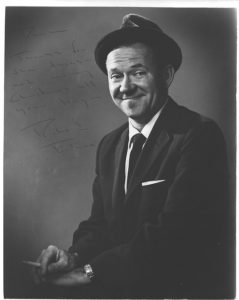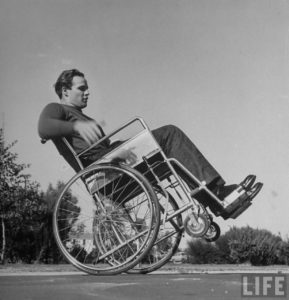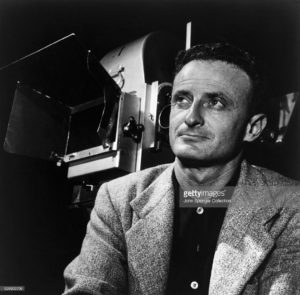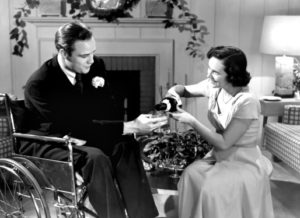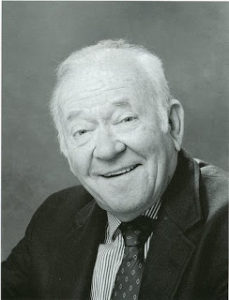The craft of acting in the 20th century breaks neatly into two distinct phases: before Marlon Brando and after Marlon Brando. He first conquered Broadway in “A Streetcar Named Desire” in 1947. Three years later, he made his first movie.
THE MEN (1950) is a grim drama set in a VA paraplegic ward. Brando is the bitter new arrival. Jack Webb and Richard Erdman play the patients who become his best buddies.
A native of Enid, Oklahoma, Erdman spent his teenage years in vaudeville, and began his Hollywood career in 1944. More recently, he enjoyed a recurring role on the NBC series “Community.”
DICK: Brando and I went out to Birmingham General Hospital in Van Nuys, where all the war paraplegics were still being treated, and we stayed there a few days, learning how to use wheelchairs, and how to get in and out of bed without using our legs.
There were about five veterans who actually worked on the film. A guy named Pat Grissom, a very gregarious fellow, and a huge man named Turk Memori, and that kid Arthur Jurado, who appears in the film; the one with the amazing body. He was a real paraplegic… and I think six months after the picture, he died.
The atmosphere at Birmingham was amazing because those guys were so ruthless with each other… deathly awful jokes they played on one another, so that no one would fall into self-pity. That was something they could not abide.
JON: I think one of the best scenes in the movie is when Brando is first brought into the ward, and you guys just tear into him. It’s a scene that goes a lot farther than you expect.
DICK: I think Carl Foreman—the writer—really hit it with that one. That was how those guys were.
There was also a doctor we worked with named Ernest Bors, who specialized in paraplegics. I had a long chat with him one day. I asked why I’d never heard of a paraplegic before this movie, and he said it was because there weren’t any; they had all died. A lot of them committed suicide. Bors was a pioneer in treatments that allowed people to live with it; the doctor played by Everett Sloane in the movie was based on him.
JON: I assume you at least knew Brando by reputation when you met?
DICK: Sure, because of Streetcar. This legend had been born right off the bat. We all expected he would go back to New York and become a great, great actor of the stage, but he never did. A lot of us were very disappointed by that.
He didn’t talk to me at all when we first went to Birmingham, he just worked with the guys. Then one day an actor named Luther Adler was staying at my little apartment on Hollywood Boulevard, and told me to say hello to Marlon for him. So I did, and Marlon asked (Brando-esque), “How do you know Luther? Where is he?” When I said he was at my place, Marlon came to visit, and they had a nice reunion.
Now the Adlers never heard the word “hotel.” They stayed with people. Luther stayed with me, his brother Jay stayed with me—Stella didn’t; she stayed with other people—but those guys moved in, then Marlon moved in, and he stayed with me for the first four weeks of the movie.
JON: Wow. What kind of roommate was he?
DICK: He was a slob. I mean, he was clean, but he wore crummy clothes most of the time, which was pretty unusual back then… except the night they threw a party in the ward to celebrate the end of the movie, and Marlon showed up in a tuxedo!
He didn’t know a lot about classical music, and I had a pretty good collection, so he started listening to my Russian opera records. And he almost never went with American girls. Shelley Winters was calling my place night and day trying to get hold of him, but he couldn’t stand her. “Shelley, get the fuck away from me!”
You’ve probably heard the story about The Pump, right?
JON: No.
DICK: It’s been written up a lot. Well, one Saturday night, a bunch of guys at the hospital decided they wanted to go out, and they said Marlon and I should come with them… in our chairs, to see if we could pass as real paraplegics. Nobody out here knew Marlon yet—I was more afraid I might be recognized—but we went to this place called The Pump, on Ventura, which catered to paraplegics; they had extra-wide doors, and room for the chairs to maneuver. So I think there were about eight of us—drinking, having a good time—when this woman approached our table. She was probably a little high. She said, “You guys are paraplegics, aren’t you? That means you can’t walk?” Somebody said, “Yeah, that’s right.”
“That’s too bad,” she said. “You know, if you men had a true belief in God, you could get right up and walk out of here.” Now Marlon piped up: “Don’t bother us, lady! You got your problems; we got ours.” He was pretty tough with her, and the guys liked that. But it only made her focus on him the more: “You, of all of them; you look like you could do it. Do you even want to walk?” He said, “Yeah, I wanna walk!” “Then you have to imagine the power of God.” She was getting all worked up. “Just imagine His strength surging through your legs right now. You can stand!”
So Marlon struggled and struggled up out of his chair. He got to his feet, tottering —she was yelling, “You did it! You did it!” –and he fell back down. Well, the entire place was dead silent now; everybody was watching, and the woman kept badgering him to try it again… until Marlon suddenly leapt up, danced a jig in the middle of the floor, and ran out of the place! The guys were laughing so hard they almost fell on the floor, and the woman just stood there in shock.
The last time I saw Marlon he was a mess. It was about six months before he died, and I ran into him at that little country store in Laurel Canyon. He couldn’t have been nicer, jovial as all hell, but… my god.
JON: Did you have to audition with him for The Men?
DICK I didn’t audition for it. I was up for an earlier picture Stanley Kramer produced called So This is New York (1948), but they cast Leo Gorcey instead, who was one of the Dead End Kids. So when they were writing The Men, they created this character “Leo,” for Leo Gorcey again… but Leo didn’t feel like he could do it. It just wasn’t his cup of tea. So Stanley gave me the part.
I went down to the set and met this quiet little man, who was the director Fred Zinnemann.
People have kind of forgotten about him, but he did From Here to Eternity (1953) and High Noon (1952), and A Man For All Seasons (1966), which may be the best movie ever made.
I think the only thing Freddy ever said to me was, “Bubble, you bastard!” Because Brando was so sullen, he really wanted me as a contrast to that. I think Marlon was a little bit lost there at first. He was very quiet and distant.
JON: Was he trying to stay in character?
DICK: No, that’s just how he was. But gradually he got more comfortable and warmed up. Freddy worked with him a lot; they were often in the corner having long talks.
JON: And your other co-star was Jack Webb, before he got famous too.
DICK: He was already kind of famous. He’d done a radio show up in San Francisco called Pat Novak For Hire, which was the best thing he ever did; it was better than Dragnet. He and Marlon didn’t get along at all. He thought Marlon was just dumb; that his acting style was… well, Jack was a radio guy. He pronounced all his words very deliberately… Marlon didn’t pronounce them at all!
JON: How was The Men initially received?
DICK: The reviews were mixed. The New York Times liked it, but The Herald-Tribune didn’t. A couple of the big magazines didn’t like it; they thought it was too grisly. Of course it was; that was the point.
JON: Though it’s tame by today’s standards. When you think of what Oliver Stone showed in Born on the Fourth of July (1989)…
DICK: You’re right, they’re very similar pictures. I thought July was very good as well.
JON: I saw it again at the Academy a couple years ago. And just as the lights were coming down, they helped a man in a wheelchair in, and seated him about six feet in front of me. When the picture ended, they announced that Oliver Stone and Ron Kovic were there: that was Kovic in front of me; I had just watched the movie with his head in my field of vision. They got up on stage, and Kovic did most of the talking. He’s a wonderful speaker, and it was incredibly moving as he talked about his life, and how that film got made. He talked a lot about how Tom Cruise did the same things as you guys: visiting an actual paraplegic ward, and learning how to live without using his legs.
I assume you got good notices for The Men?
DICK: Generally, yes. There was one I always kept by Bosley Crowther, who was the king of the New York critics. He liked the picture, and wrote in The Times, “Mr. Brando is impressive, however he has a few things to learn from a Hollywood actor named Richard Erdman.” (chuckles) Of course, I learned a lot from Mr. Brando as well.
I was actually very disappointed at the time. The publicist Tom Gries had called me and said he had some bad news: my big scene was gone. It was my last scene, where I finally won at gambling and went crazy, wheeling all over the ward and carrying on… but it was the second to last scene of the picture, and they found audiences wouldn’t settle down for that final quiet moment between Marlon and Theresa Wright.
They couldn’t find anywhere else to put my scene, so they just cut it. It cost me an Oscar nomination, no question about it… but what are you gonna do?
The same thing happened to me on The Best Years of Our Lives (1946). I was under contract to Warners, but my agent took me over to meet Goldwyn and Willie Wyler. They gave me the part, but J.L. wouldn’t let me do it.
JON: What part was it?
DICK: The one that won two Oscars!
JON: How could you have played a man with no hands?
DICK: Because the character was originally written as a spastic. I went to Jack Warner’s office—the only time I ever met him—I said, “Mr. Warner, this is a goddamn wonderful part, and I beg you to let me have this. It’ll make my career.” He said, “We don’t loan our people out.”
JON: Oh, well. It was only one of the greatest pictures ever made. It probably toughened you up, huh? A good dose of Hollywood cruelty right off the bat?
DICK: It sure did.
JON: But I assume The Men was your breakout, even without that last scene?
DICK: It was. That, and a picture called Cry Danger (1951), with Dick Powell. Having those two back-to-back really kicked off my career. We just saw Cry Danger again last weekend; they had a film noir festival up in San Francisco, at this wonderful old theater, The Castro. There were twelve hundred people there, and they gave me a standing ovation… for about three minutes! I couldn’t believe it.
JON: You went on to play dozens of military parts throughout the fifties and sixties. Was that because of The Men as well?
DICK: That, and they just made a lot of war pictures back then.
JON: Had you actually served in the military?
DICK: For three days. I enlisted in the Air Force right out of high school, and they sent me down to March Field, but they sent me home again because I had no sense of smell. I was in a car accident when I was young; I hit my head and was out for seventeen hours, and when I woke up, my sense of smell was gone. The Air Force said I’d be “a menace” because I wouldn’t be able to smell smoke or a fuel leak if anything went wrong. So I came out here and got a contract with Warner Bros. and hoped I wouldn’t get drafted. Thankfully, I didn’t.
JON: Your most famous war film is probably Stalag 17 (1953), but a lesser known one I really admire is Objective, Burma! (1945).
DICK: That was one of the first really brutal war pictures; it broke a lot of ground. Raoul Walsh directed it.
JON: I like it because there’s not a lot of phony Hollywood drama crammed into it. It’s a very nuts-and-bolts procedural about infantry tactics and combat operations. You could almost run it for troops today as a training film.
DICK: It was a miserable shoot. We did most of it during the summer up on that hill overlooking Warner Bros., and a swamp out in Pasadena on Lucky Baldwin’s old estate. We were out there, up to our necks in goddamn slime, carrying those guns through that swamp… it was awful. Two guys got killed on that shoot. One of them fell off a parallel, and another backed into—I can’t remember what—but it broke his spine and killed him.
Now Errol Flynn was a terrific guy; I liked him a lot. When that guy fell off the parallel, somebody said they should take his body to a hospital, but this unit manager we had—this son of a bitch—growled, “We’ll get this last shot, and take care of him when we go to lunch!” Errol said, very politely, “No, we stop shooting right now. Get that man to a hospital.” …and he walked off the set!
I remember the very first day, they brought us these awful lunches—powdered eggs and stewed tomatoes—just a shitty, awful lunch… and they served Errol the same thing! He took one look at that, and had it sent down to Jack Warner’s office, with a message: “We get decent food up here by two o’clock, or we stop shooting.” There was an actor named Frank Tang, who had a restaurant downtown called Tang’s. He said to Flynn, “You want Chinese food?” Thirty minutes later, they were unloading it for us. Flynn took the bill… and gave it to Warner!
JON: He took care of his men. Just like in the film.
So you’ve been on this new show Community a couple times?
DICK: I’ve done three so far, and I’ve got two more. They just got picked up for a second season… why, I’m not sure. It’s about #60 in the ratings.
JON: Who’s your character?
DICK: I don’t know. They’re just these little bitty parts. I asked the director, “Who the hell is this guy?” He said he didn’t know. So I went and found the writer and asked him, and he said, “We’re going to find out in the eighth show.” I said, “How should I be playing it until then?” He said, “We haven’t decided yet.”
JON: I suppose after all these years you’ve probably heard everything.
DICK: I’ve never heard anyone say that before! I can’t wait to see that script… so I can see what I’m doing right and what I’m doing wrong!
Originally appeared March 22nd, 2010 at The Hollywood Interview.com

